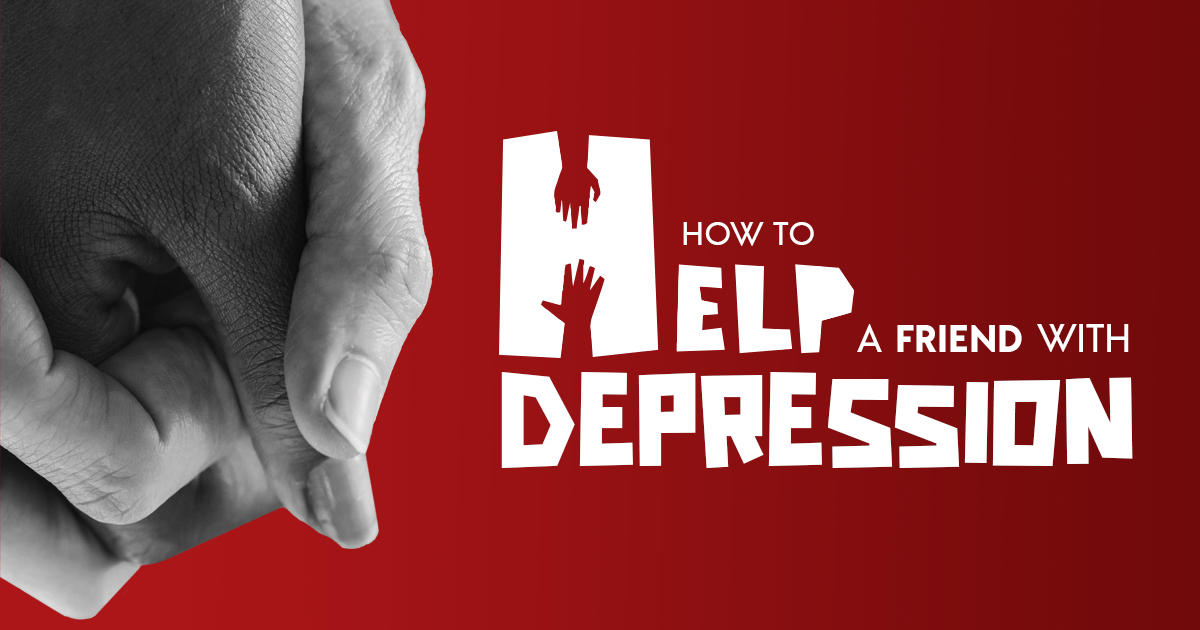We get it. It isn’t pleasant to see a friend withering in depression. You care about them, you want to help them, but you don’t know where to start. If that’s you, you’re not alone. It isn’t difficult to notice when a friend could be wiping tears under their pillow, so this article will help you with how to help a friend with depression.
In these types of situations, knowing what to do isn’t obvious. It’s easy to say the wrong thing and make it worse inadvertently. Seeing a friend in pain yet not knowing how to help can quickly plunge your friendship into a swamp of confusion and helplessness. Should you ask about it? Should you wait? What should you say? These are all questions that may be ruminating in your head.
What to Do to Help a Friend with Depression
This article will reveal six science-backed ways you can help your friend cope with depression. If you’re reading this, remember that you’re already taking the proper steps; it shows you care. This handy guide will do the rest and show you how to support someone with depression.
- Reach out
See, depression tends to make people retreat into their solitary and secluded rabbit holes. If that describes your friend, send them a message to ask them if they’re okay. Tell them you’re thinking about them and that you’re here to help. If possible, take them out for coffee, and give them space to vent life’s frustrations over a warm cuppa. It can make a big difference to them if they know you’re there, whether they take you up on your offer or not.
- Acknowledge their pain
Don’t be that friend that tells them to “snap out of it.” See, all too often, and without realizing it, we tend to dismiss or belittle the mental anguish of others. We expect them to get over it, whatever that means. But this is unhelpful and often makes the situation worse.
Instead, just try and listen. Understand their pain. Ask questions. Hear them out. Most importantly, tell them that their feelings are valid because they are. Nobody should be blamed or judged for feeling terrible. Why? Because it could easily be us on a rainy day!
In other words, to be the supportive partner you want to be, acknowledge and accept their feelings. You never know that enough may empower them to so-called “snap out of it.”
- Don’t tell them what to do
And, as tempting as it may be, avoid the urge to find a solution. Sure, offer words of comfort and encouragement, pat them on their shoulder if need be, but stay a truck’s length away from the “advice trap.”The reality is that clinical depression is mired with complexity and can arise from a whirlwind of mysterious events and traumas from the past. The causes and cures are not so simple or obvious. Remember, if it were that easy, they’d have done it by now.
Tired of knowing what “not” to do? Then read on for some actions you can do to speed up their recovery.
- Point them to places they can find support
Hate to break it out to you, but clinical depression is an illness. It’s not “like” an illness; it is one. That’s why, to help a friend with depression truly, you must direct them to seek “professional” help and support. Whether that’s through visiting a counselor or joining a support group, make sure your friend knows where they can find the support they need.
As hinted above, depression is a complex illness with many causes. It could arise from a traumatic event, a rough childhood, or even the birth of a baby (which is known as postpartum depression). While you may not be familiar with the different shapes it can take, a professional most certainly will.
Here, you can do two things. First, you can encourage your friend to seek help and praise them when they do. This is important because it takes a great deal of courage to accept a problem and seek external support. Second, make sure have the information needed to access medical help, like contact details and names of organizations that can assist.
If they feel the urge of suicide or self-harm, order them to call an emergency hotline.
what habits can help with depression, i.e., noticeably reduce symptoms?
Let’s see!
Habits to Beat Depression
Daily habits and even small changes to your typical routine can help with depression. Sometimes simply changing your sleeping schedule and trying out a new hobby can keep symptoms at bay.
Here are few actions you can take:
- Have a Good Sleeping Schedule
Getting a good night’s sleep can help with depression, but getting too much sleep can actually make things worse. Nevertheless, the fact is that depression and sleep are connected.
Research shows that disturbed sleep and chronic sleep deprivation can increase the chances of developing depression and worsen existing symptoms. Still, some studies have found that people with depression sometimes sleep more than ten or even twelve hours, so including acute sleep deprivation can reduce depressive symptoms in 40-60% of treatments. This is thought to serve as a kind of “reset” for the body.
We can conclude that having good sleeping hygiene can help with depression from all of this. We recommend going to bed simultaneously every night and sleeping from 7 to 8 hours (not less or more).
- Eating Healthy and Varied Food
Another thing scientists have found is that food affects our mood in more ways than one. Therefore, keeping eating healthy is good not just for physical health, losing weight, and looking good, but for our mental health. There are several mechanisms for how this happens.
First, obesity is strongly associated with depression. Plus, studies have found that processed foods and high-fat diets increase the risk for depression and worsen existing depressive symptoms.
Second, several vitamins and minerals have been linked to depression. For instance, most people have depressive symptoms when they’re deficient in vitamin D. A healthy diet with lots of vitamins and antioxidants can fix that. Plus, evidence shows that following specific dietary recommendations helps with depression.
- Do Some Light Exercise
Another weapon against depression is physical activity. Yes, exercising might seem like the last thing you want to do when you’re depressed, but mastering up the courage to go walk your dogs, run with a friend, or dance to your favorite song can immediately change your mood.
And, if you convince yourself to get on your mat or go to your local gym, following an exercise regime can quickly make you euphoric. Many psychotherapists prescribe exercise as part of patients’ treatment for depression.
- Reduce Clutter
Some people with severe depressive symptoms can’t find it hard to do basic household chores, which is why maintaining a clean home becomes an incredible burden.
However, living in a cluttered home can negatively affect people’s mental health and worsen symptoms of depression. Sooner than later, this will lead to feelings of helplessness and detachment from one’s environment.
To prevent such a scenario, it’s best to reduce clutter to a minimum. Throw out or give away everything that you don’t absolutely need or use. Also, create a plan for household chores that will help you be more efficient.
- Establish a Productive Routine
Recent studies have shown that regulating daily routines is a great way to improve your mental health and depressive symptoms.
This is because establishing a healthy routine provides support and structure. It gives people purpose to get through the day and keeps them occupied, which is always beneficial. According to Mental Health America, people with daily routines have lower levels of distress when facing problems with their health or negative life events.
Getting Help
If you’re worried about a friend’s safety or believe that they may harm themselves or someone else, please dial 911; to learn more about depression treatment for yourself or a loved one please call (866) 476-2823 and talk to a team member at Story Wellness today.





